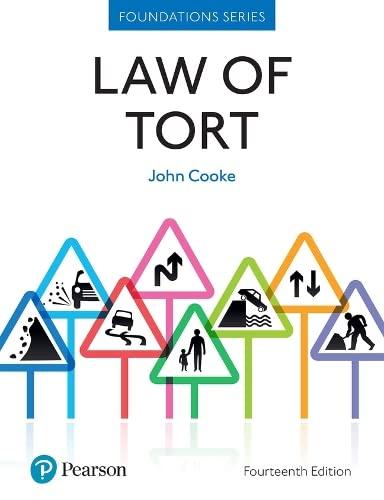Question
Frank opened a new business downtown, a liquor outlet called the West Coast Bar & Grill. Frank's venture was very successful and over the
Frank opened a new business downtown, a liquor outlet called the " West Coast Bar & Grill". Frank's venture was very successful and over the span of three years his business attracted a regular and loyal clientele. The location of the business, alongside False Creek in Vancouver, contributed to its popularity. Frank registered the intellectual property rights to the name of his business including the style of writing on his sign and letterhead. One day whilst driving along the waterfront in Richmond, Frank noticed that a new liquor outlet had opened. This new outlet was called the "Best Coast Pub" and used lettering similar to that on Frank's sign. Frank had noticed that over the last few months his business had been falling off and he wondered where his regular customers were going.
What intellectual property rights did Frank register?
What protection does Frank have over the name of the bar?
If Frank sues in court, what will be the basis of the suit?
What remedies can the court award?
What test will the court use to determine if Frank is entitled to enforce his rights against the Best Coast Pub.
What will be the court's decision and why?
2.
Using her business connections, Ms. Jackson was appointed to the Board of Directors of Huge Oil Company, a British Columbia oil and natural gas company.Ms. Jackson thought that her position as a Director would elevate her level of prestige and help out her fledgling financial consulting business. Ms. Jackson continued as a Director for three years and had been appointed chairperson of the Audit committee of the Board of Directors and was becoming an active and well-informed member of the Board.
Huge Oil had five oil refineries across Canada, as well as several oil and gas properties in Alberta and the Northwest Territories. Despite some improvements, two of the refineries were reaching the end of their useful life. The Board of Directors had spent several months debating whether to close the refineries or spend significant amounts of money to upgrade them. During this time the transfer system at the British Columbia refinery, which moves oil to the refinery from tankers at a wharf owned by Huge Oil, suffered a significant failure. The result was a major spill of heavy oil into the marine environment.
The consequences of the spill were devastating to the local fishery, the local economy and to the environment. Over the next year it became apparent that the losses and clean up costs from the spill would amount to hundreds of millions of dollars. The Board of Directors also learned that the company's insurance would only cover part of the loss and that the company did not have the resources to cover the remainder of all claims. It also became clear that Huge Oil, as a result of paying claims, did not have the money to remit the necessary withholdings to Revenue Canada (also now as The Canada Revenue Agency) which had been held back from the employees paycheques. Nor, for that matter, did the company have the money to pay workers unpaid wages or to pay Provincial Tax authorities in B.C.
What is the liability of Ms. Jackson for any and all claims? What can she do, or what should she have done, to possibly avoid liability?
Step by Step Solution
There are 3 Steps involved in it
Step: 1

Get Instant Access to Expert-Tailored Solutions
See step-by-step solutions with expert insights and AI powered tools for academic success
Step: 2

Step: 3

Ace Your Homework with AI
Get the answers you need in no time with our AI-driven, step-by-step assistance
Get Started


